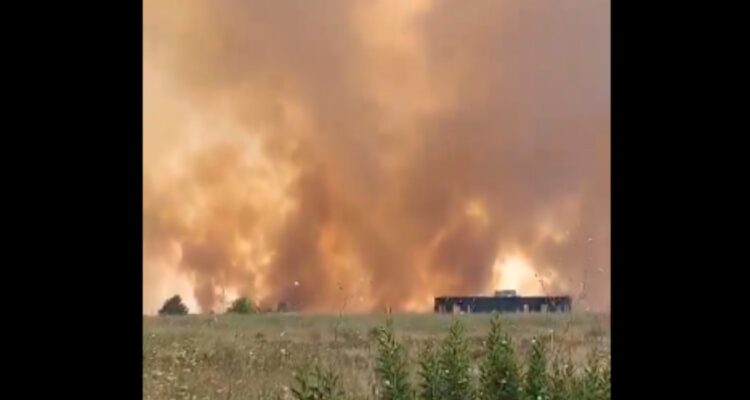Amos Hochstein, a senior adviser to US President Joe Biden for energy and investment, will head to Israel on Monday to temper tensions between the Jewish state and Hezbollah.
By Corey Walker, The Algemeiner
The Biden administration has been pushing the Israeli government to de-escalate hostilities with Hezbollah to prevent a full-scale war from breaking out along Israel’s northern border with Lebanon, where the powerful Iran-backed terrorist group wields significant political and military influence.
In Israel’s north, Hezbollah terrorists have been firing rockets at Israel daily from southern Lebanon since Hamas’ Oct. 7 massacre, leading Israeli forces to strike back.
Tensions have been escalating between both sides, fueling concerns that the conflict in Gaza — the Palestinian enclave ruled by Hamas, another Iran-backed Islamist terrorist group, to Israel’s south — could escalate into a regional conflict.
More than 80,000 Israelis evacuated Israel’s north in October and have since been unable to return to their homes. The majority of those spent the past eight months residing in hotels in safer areas of the country.
The mass displacement has ramped up pressure on Israeli Prime Minister Benjamin Netanyahu to find a swift resolution to the situation.
The ongoing conflict between both sides escalated on Tuesday when senior Hezbollah commander Taleb Sami Abdullah was killed in an Israeli strike in southern Lebanon.
Hezbollah responded by launching over 200 missiles into northern Israel.
During Abdullah’s funeral, senior Hezbollah official Hachem Saffieddine vowed that the terrorist group would intensify its strikes on Israel.
“Our response after the martyrdom of Abu Taleb will be to intensify our operations in severity, strength, quantity and quality,” Saffieddine said. “Let the enemy wait for us in the battlefield.”
In Israel, meanwhile, officials have said they prefer a diplomatic solution to the current crisis but are prepared to escalate military action to push Hezbollah back from the border in order to allow internally displaced Israelis to return home.
Polling has shown that the majority of the Israeli public wants the military to engage in expanded actions against the Lebanese terrorist group, which is committed to Israel’s destruction.
The Biden administration has been advising Netanyahu against pursuing the idea of a “limited war” against Hezbollah, arguing that it could spark a regional war throughout the Middle East.
According to multiple reports, US officials have warned Israel that Iran could dispatch militants from Syria, Iraq, and Yemen into Lebanon to bolster Hezbollah’s effort.
The White House has also expressed concern that Israeli officials do not have a clear strategy on how to keep the war contained to solely Lebanon.
Fear of a broader regional war has intensified the Biden administration’s urgency to finalize a ceasefire deal between Israel and Hamas, which launched the ongoing war in Gaza by slaughtering over 1,200 people throughout southern Israel and kidnapping more than 250 others on Oct. 7.
“We are concerned about an increase in activity in the north. We don’t want this to escalate to a broad regional conflict and we urge de-escalation,” a Pentagon spokesperson told reporters this week.
The Pentagon also released a statement saying that Israeli Defense Minister Yoav Gallant and his US counterpart Lloyd Austin discussed efforts to “de-escalate tensions along the Israel-Lebanon border in the wake of Lebanese Hezbollah’s increased aggression.”
According to multiple reports, Amos Hochstein, a senior adviser to US President Joe Biden for energy and investment, will head to Israel on Monday in an effort to temper tensions between the Jewish state and Hezbollah.
Hochstein will meet with Netanyahu and Gallant with the goal of swaying them against green-lighting a “limited ground invasion” in Lebanon. Hochstein will reportedly also journey to Beirut to conduct discussions with Lebanese officials.
“There was a lot of work, diplomatic work done behind the scenes by several folks in the US administration, working with regional powers and our allies to try and tamp this down,” Hochstein has said regarding the prospect of a regional war erupting in the Middle East.
Hochstein argued that preventing a large-scale war between Israel and Lebanon requires “active engagement” with both parties and for the public of both countries to “understand the risks” of further escalation.
He added that “despite the bravado talk” coming from government officials, Lebanese people do not to go to war with Israel.
“The bottom line is a lot of civilians will die,” Hochstein said.
Despite chest-thumping by Hezbollah leaders, experts believe that the elimination of Abdullah might cause Hezbollah to exercise caution in engaging further with the Israel Defense Forces (IDF).
“The powerful elimination worries Hezbollah members. They now understand that the IDF knows much more about them than we do,” Professor Amatzia Baram told The Jerusalem Post.
“Additionally, the operation indicates that Hezbollah’s field security is not airtight and that the organization’s intelligence system has been penetrated to such an extent that we were able to eliminate such an important sector commander. The IDF managed to infiltrate their networks and systems and identify the right people for elimination.”





